Happy post-holiday Monday! Hope you had a nice Thanksgiving break and are staying warm.
Before we embark on another week of news and content, let’s look back at the most important stories we came across in the past week.
Campaigns matter: The residents of Berkeley, California elected a new mayor who campaigned on a platform for safe streets and beat an incumbent who opposed walk and bike infrastructure. (SF Chronicle)
A cycling martyr: The Mayor of Paris says a man who was killed while cycling by a road raging SUV driver should be recognized as a hero for his work as an advocate and a symbol that the French city refuses to end its war on cars. (NY Times)
Language matters: An effort to improve the way police and media talk about traffic crashes is bearing some fruit in the UK as new research based on the Road Collision Reporting Guidelines has been published. (Road.cc)
Show me the money: Turns out that even with all the overhead associated with collecting more parking fine revenue in Portland, it is still a revenue-positive endeavor. (Willamette Week)
Road diet homework: If you want to sharpen your responses to people who oppose road diets for nefarious reasons, read this opinion piece that does so with a very reasonable and pragmatic tone. (Minn Post)
Blaming pedestrians: A controversial story amplifies voices that believe there’s simply no way to eliminate traffic deaths as long as some people don’t take more steps to be safe while walking. (San Francisco Standard)
Words about the ‘war’: Another perspective about the ‘war on cars’ is that it’s just complete and total hogwash with no basis in reality. (The Toronto Star)
Thanks to everyone who sent in links this week. The Monday Roundup is a community effort, so please feel free to send us any great stories you come across.



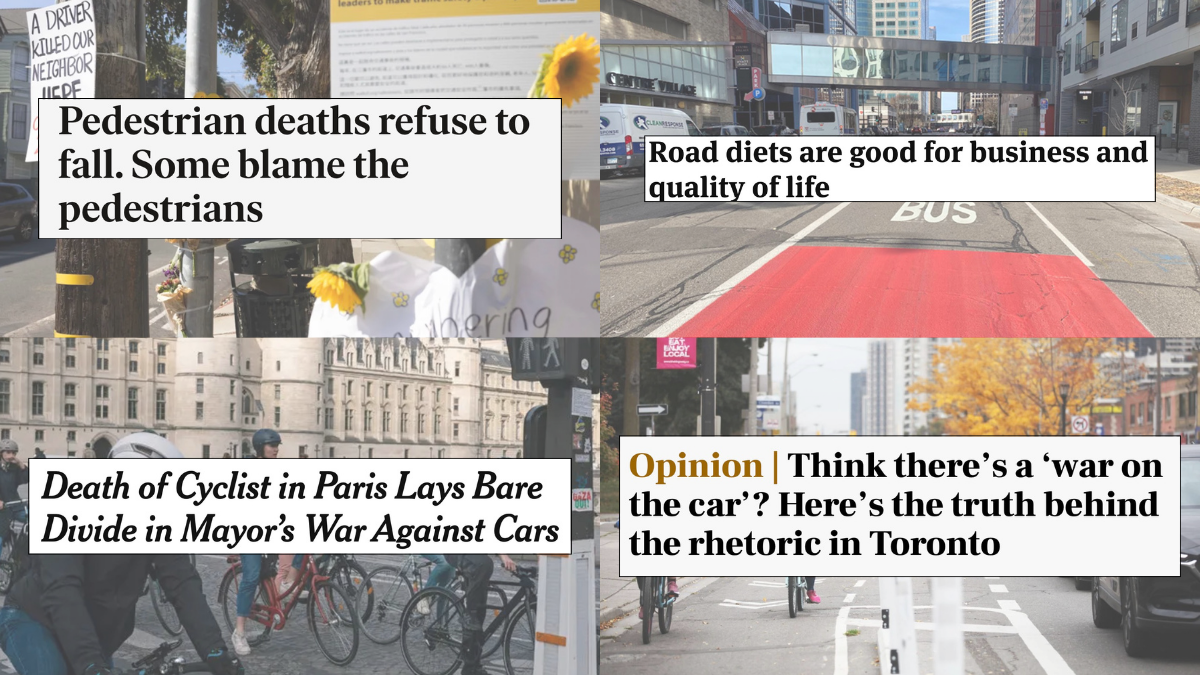
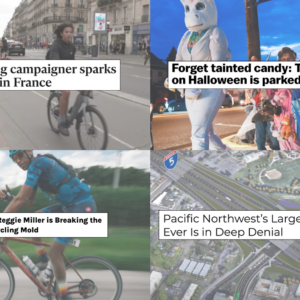
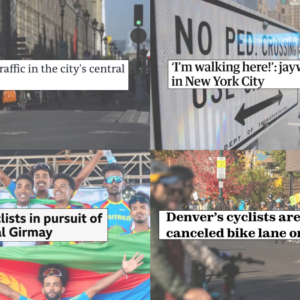
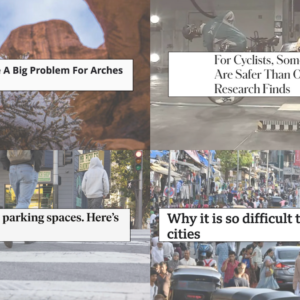
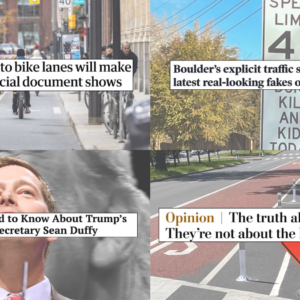
Thanks for reading.
BikePortland has served this community with independent community journalism since 2005. We rely on subscriptions from readers like you to survive. Your financial support is vital in keeping this valuable resource alive and well.
Please subscribe today to strengthen and expand our work.
“Blaming pedestrians”
Of course it’s not productive to blame pedestrians for traffic deaths. Yet what we often do in Portland is put on blinders (for political reasons) as to which population is the most impacted by pedestrian deaths. It’s the homeless. It’s not compassionate to allow people to live on the streets yet we not only allow it, we enable it. The “low hanging fruit” for reducing traffic deaths here is to end unsanctioned street camping.
https://www.oregonlive.com/data/2023/11/unhoused-portlanders-account-for-45-of-pedestrian-traffic-fatalities-so-far-this-year.html
An unhoused person who moves into an apartment is going to have the same errands to do, like as not in the same part of town. Housing doesn’t come with a car. These people will still be walking places, in their best mind or otherwise. They’ll still be vulnerable road users and they’ll still receive a poor level of service from the streets they must cross, or merely stand beside to wait on transit.
People who live or use the sidewalk near busy streets are not strictly to blame for everything that happens to them. Where a person sleeps doesn’t make them more or less safe on the street.
This untrue — if they are sleeping by a highway offramp (for example), they are more likely to interact with vehicles there than someone sleeping in a shelter. Offramps are a very dangerous place for pedestrians to be, and are a terrible place to camp if your primary concern is getting hit by a car.
If a person is just walking from a shelter to a store or an office or a medical facility, they’ll probably be ok, just like the rest of us.
Do the errands involve walking down the shoulder of I-84 to reach a tent back in the woods? I had the misfortune of seeing the aftermath of a pedestrian fatality in our city this year. I don’t think it would have happened if that person had been in a shelter.
I’m sorry that thing happened of course, sorry for the victim and sorry that it was where you witnessed it.
I sleep indoors and ride or walk on neighborhood streets, sometimes arterials. Open freeways never, except by chance with 10,000 other people. I’m regularly put at risk by people in cars neglecting stops and fully ignoring crosswalks.
What I object to is having this characterized as a homeless people problem, as if them being out of sight would make our problems of drugs or car crashes or crime just go away.
Unhoused people are people. They need a chance at housing for sure, but houses aren’t magic. I can think of many instances of drivers crashing their cars into houses, bars, bike shops, etc.
If a person camping gets hit by a car that’s a car and driver problem, not a tent problem. No, a freeway ramp isn’t a great place to be, but a person should be able to walk I84 from here to Idaho and not die, if that’s the sort of thing they like.
It’s messed up that our default mode of transportation kills a person in Oregon every 17 hours.
It should be obvious that people are materially safer when they don’t live/sleep in dangerous places. Bringing people into the system, with access to services and treatment, is fundamentally more humane than leaving people on the street to fend for themselves.
Sheltering the unsheltered will not make problems with drugs or car crashes go away, but it is a good thing to do nonetheless.
Does it seem like I’m against housing? I’m not, house away, good on you. But, not everyone has the same needs. It’s weird to us that a person would seek out the toxic areas we’ve abandoned to motor vehicle use, but there’s no landlord and no HOA.
I don’t know if we can build our way out of a housing crisis, but if we could make mundane transportation predictably less lethal that would benefit us all. Based on the average over the year, two people died in Oregon car crashes since this article was posted.
I don’t recommend anyone start searching for news reports of recent crashes. Let’s just say it was a really long weekend, starting Thursday morning when a car crashed into an ice cream shop in Hillsboro, Oregon. Two people were injured. It’s not clear if their housing situation had any bearing on that.
No. Nor am I against making driving safer. What I am arguing against here is that we should not allow people to set up informal housing in places we know to be particularly dangerous.
Why do you disagree with that?
We let people have swimming pools, a measurable hazard. We let them do their own electrical wiring, subject to inspection, ha!, and we let them keep firearms in their house. Welcome to the USA.
It’s not great to camp near roads and it absolutely reflects poorly on our society but I think I understand why people do it.
I’ve seen the numbers on who is getting killed on Portland streets and it’s appalling. Let’s be clear: poorly operated tents are not decimating vulnerable car passengers. It’s the other way around. Sure it’s easier to put the clamp down on street camping but is that justice?
It’s a practical way to keep people alive, and is probably more feasible than asking everyone on a highway or offramp to drive 20 MPH in case someone staggers out of a tent.
Again, you don’t need to get rid of all street camping to improve safety, only in the most dangerous places.
This debate is tired, the arguments voiced could come from any of thousands of people in this city who make the homeless debate a proxy for larger critiques of American society.
They are actually seeking to establish a rhetorical position: RADICAL change is needed; “Hark ye, hark ye! This Country is fallen and must be redeemed!”
Yes, life is bad, it sucks all over the world, religion will tell you it always has, our bodies fill up with pain and illness in Portland and in Africa, in ancient times and now.
But we don’t do religion in Portland because our religion is toxic positivity; utopia building. Just another form of escape, like a marxist Dungeons and Dragons.
You could call it virtue signalling.
But we should. Unsanctioned street camping is dangerous, cruel, inhumane and leads to a multitude of societal ills along with decreased livability for the population at large.
When I’m a pedestrian, I wish I had the same powers to cause cars to suddenly stop and flip over when violating through my right to cross a street at an unmarked crosswalk and signalized intersection, some sort of laser pointer or ray gun that hits the tripping button in every car – you break the law driving such a murder weapon, you get injured or die depending how fast you were going, instead of me getting killed when you hit me. But alas we aren’t there yet.
No we’re not fortunately. I hear your anger and frustration but more violence should not be the response to violence. However, Portland could like most cities in America and Europe not have people sleeping “willy nilly” at multiple places in very dangerous locations where they are at a high risk of becoming dead pedestrians. It really is the compassionate and responsible thing to do and a better way to reduce pedestrian deaths than killing or maiming people driving cars as you suggest.
I’m sorry, but please explain to me, why exactly should we be compassionate towards those people who are out to murder us? Careful considerate drivers, the vast majority of drivers, do in fact drive at reasonable speeds, keep both hands on the steering wheel, etc. However, there’s quite a number of other drivers who have a pattern of getting drunk and/or high and/or medicated and/or are simply awful drivers, who seem to kill with impunity (either in hit-and-run incidents or stick around and tell police “he came out of nowhere”).
These are deadly crashes, not accidents. Anyone driving over 20 mph knows, or should know already, that they are driving a loaded handgun with the safety off. It’s the driver who needs to “do the responsible thing”, and not the pedestrian.
Other than installing spikes on steering wheels and shutting down any street that has a fatal crash, I think you hit all the highlights.
David, I get it—there are some drivers out there who act like they’re in an action movie, and it’s terrifying and Portland is ground zero for this behavior. You’re right that reckless driving isn’t just an accident; it’s a deadly choice. But saying we should just flip the script and take out drivers with a “ray gun” isn’t the answer. If we start going down that road, it’s just chaos.
The real solution is holding these drivers accountable—stricter laws, better enforcement, and more pedestrian-friendly infrastructure. Drivers need to be responsible, and yes, they’re driving a “loaded handgun” when they’re speeding, drunk, or distracted. But that doesn’t mean pedestrians should take matters into their own hands. We’ve gotta fight for real change, not vigilante justice.
David, I get that you’re frustrated with how unsafe it can feel as a pedestrian, especially when drivers don’t follow the rules. It’s true that pedestrian safety is a huge issue, and many people have been hurt or killed because drivers are speeding, distracted, or not respecting crosswalks. But the idea of using a “laser pointer” or “ray gun” to hurt drivers is really concerning. It’s important that we focus on solutions that promote safety for everyone, not just ways to hurt others or make them fear for their lives.
Rather than a fantasy of vigilante justice, how about we push for better enforcement of traffic laws, stronger penalties for reckless driving, and improved infrastructure like more visible crosswalks, speed bumps, or pedestrian-only zones? We need to prioritize preventing accidents in the first place, not responding to them with violence.
It’s important to fight for safer streets, but we have to do it in a way that leads to real, positive change, not harm.
Yes, famously it’s very easy to get people off the streets.
What solutions do you have in mind? And before you say “harsher punishment” (meaning jail?), it’s probably worth considering if jailing people for having no money to provide themselves with shelter is even constitutional (much less ethical)
You don’t need to end all street camping to improve safety; just prohibit it in those areas where it’s particularly dangerous, which we’ve done to a certain extent. If people insist on setting up camp where it’s prohibited, provide legal notice to move, accompanied by an offer of shelter and services, and if people refuse, remove the campsite.
This process is pretty well established, and seems to be working in many of the chronic problem areas in Brooklyn and HAND, and even the Powell underpass is now clear much of the time.
Maybe you don’t like this approach for some reason, but we’ve tried the alternative — anything goes, anywhere and everywhere — and that wasn’t so good either.
The constitution is whatever the Supreme Court says it is; they’ve answered your question that it is constitutional. City of Grants Pass v. Johnson
I’ve been to jail, it wasn’t that bad, I’d take it (for a while) over living in a tent and being passed a meth pipe in the morning (which I’d probably accept) ANY DAY.
Particularly if jail worked in conjuction with a system of support after your are released–isn’t the idea to try to rehabilitate people?
How is living in a tent getting passed a meth pipe every morning to wake up, gonna do that?